【中考夺分天天练】2015届中考英语(人教版)总复习 第一篇 基础巧过关 :八年级下册 [Units 1—2](共33张PPT)
文档属性
| 名称 | 【中考夺分天天练】2015届中考英语(人教版)总复习 第一篇 基础巧过关 :八年级下册 [Units 1—2](共33张PPT) | 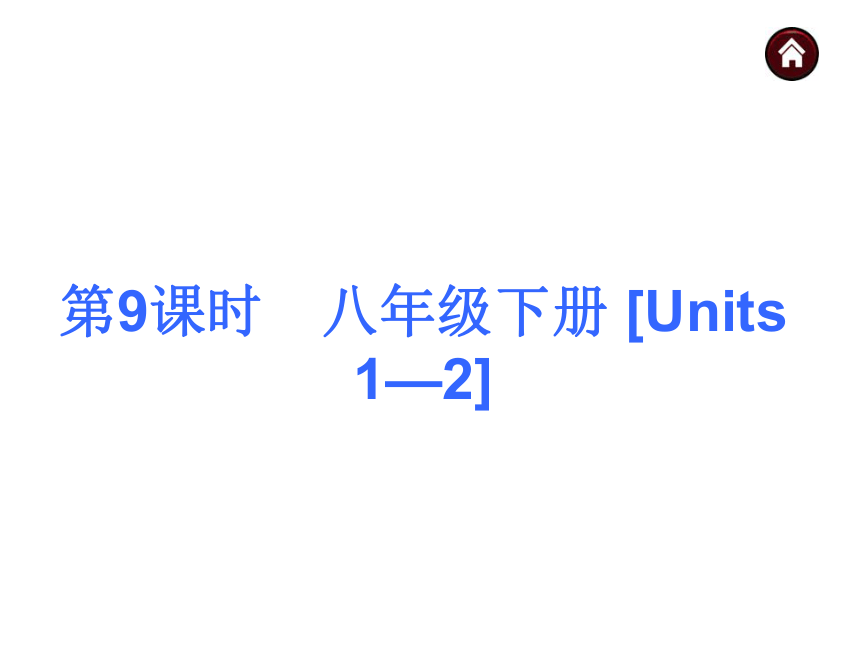 | |
| 格式 | zip | ||
| 文件大小 | 32.9KB | ||
| 资源类型 | 教案 | ||
| 版本资源 | |||
| 科目 | 英语 | ||
| 更新时间 | 2014-12-05 06:34:33 | ||
图片预览

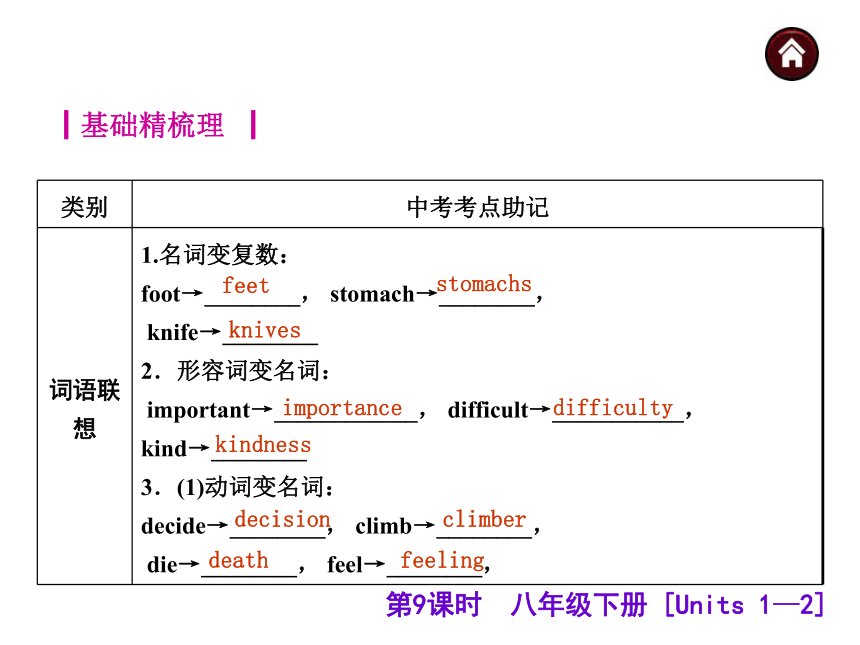
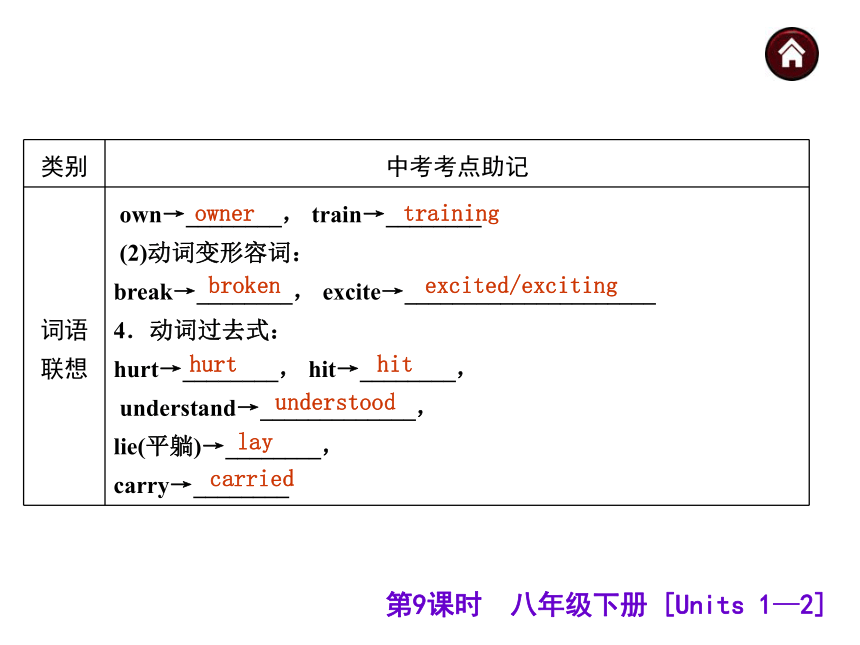
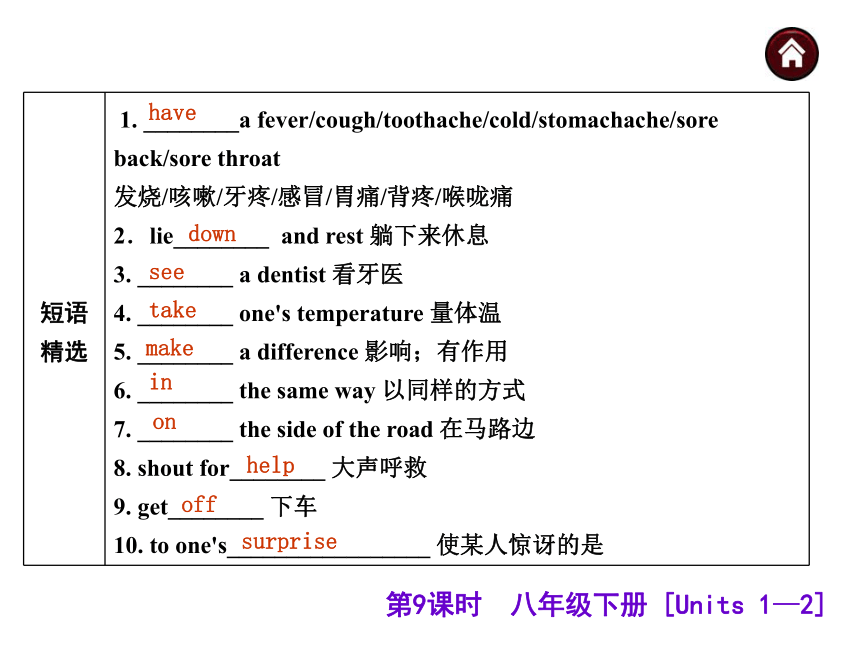
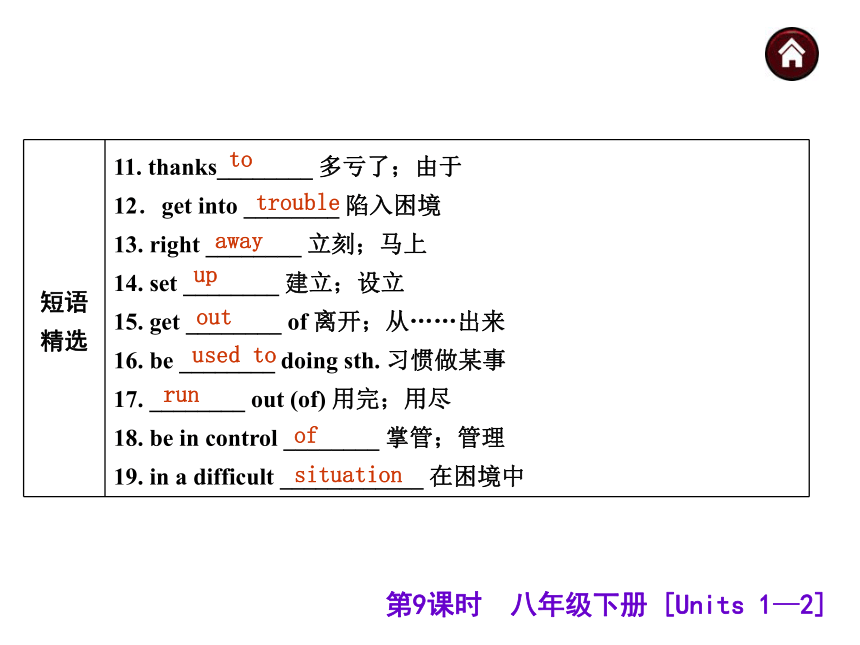
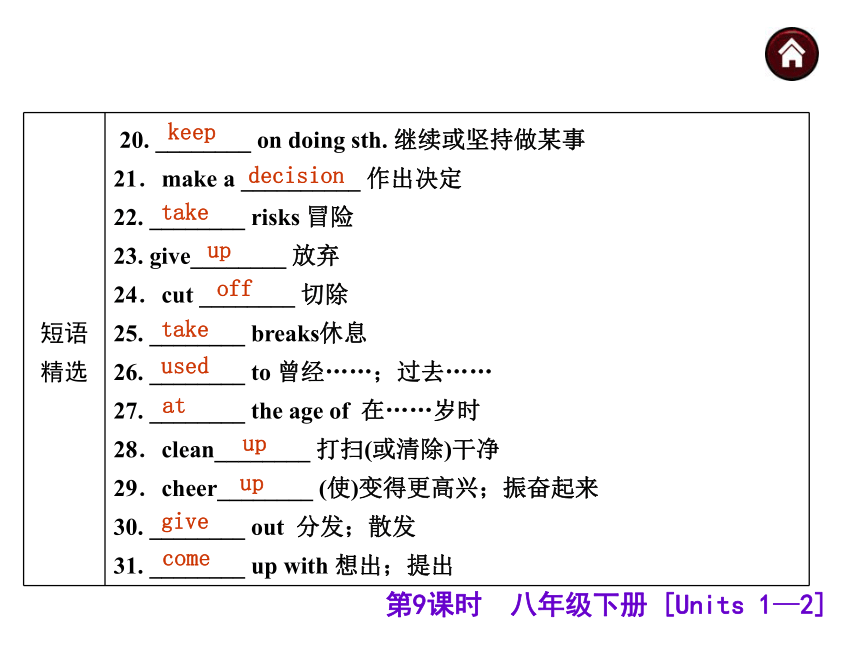
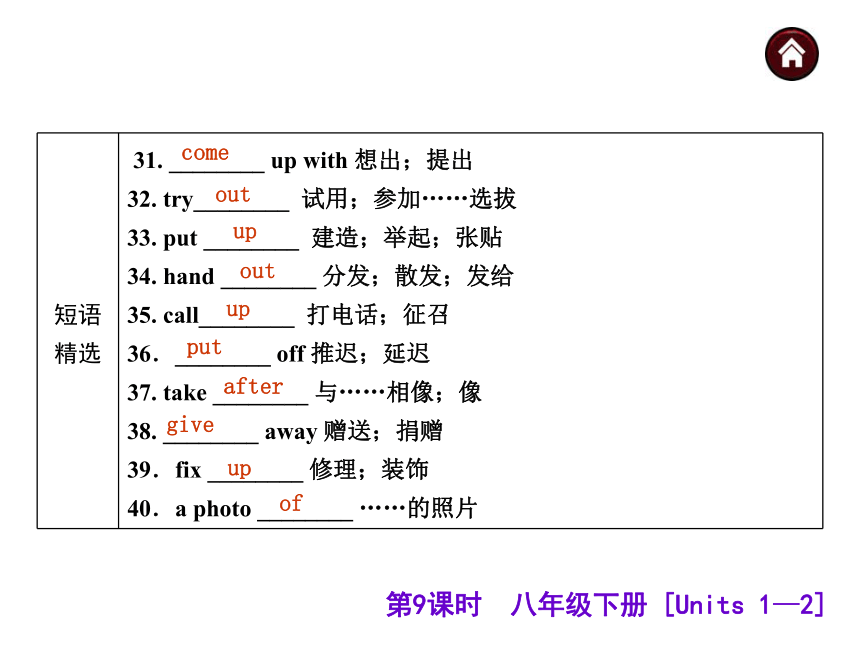
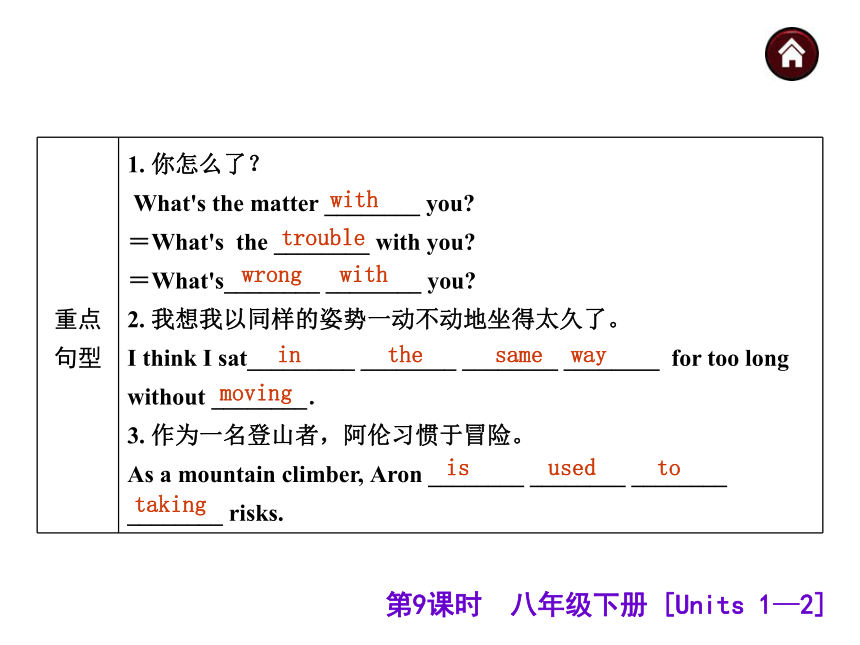
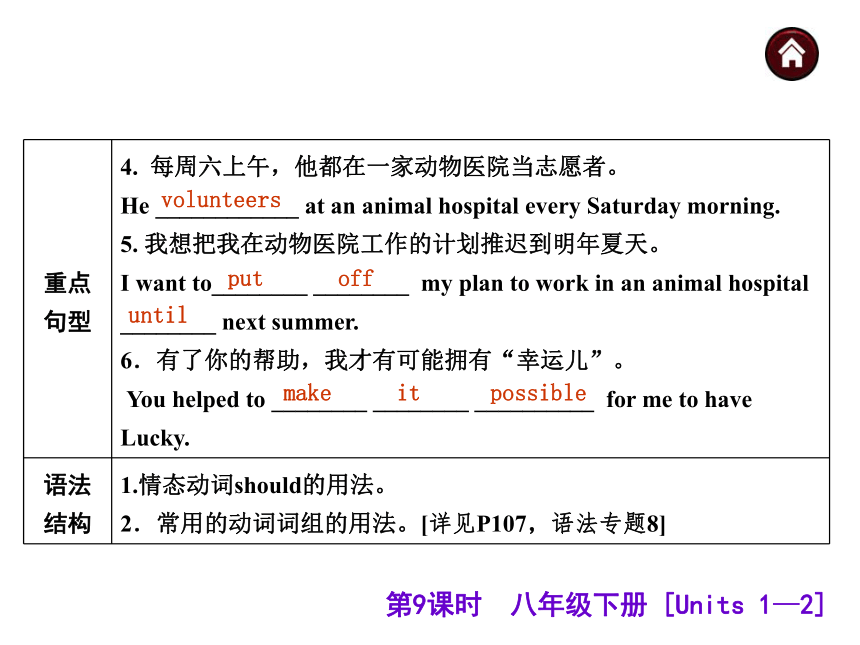
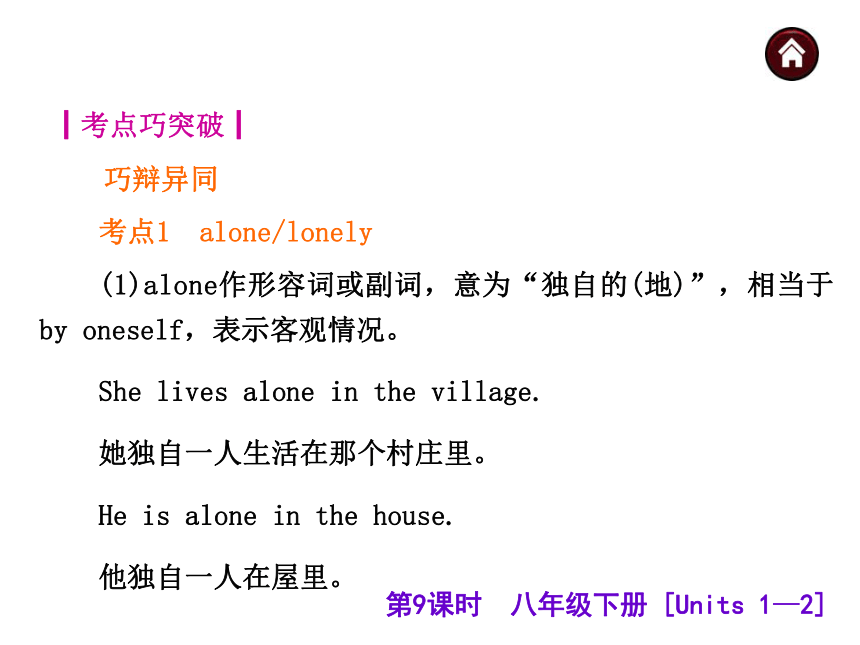
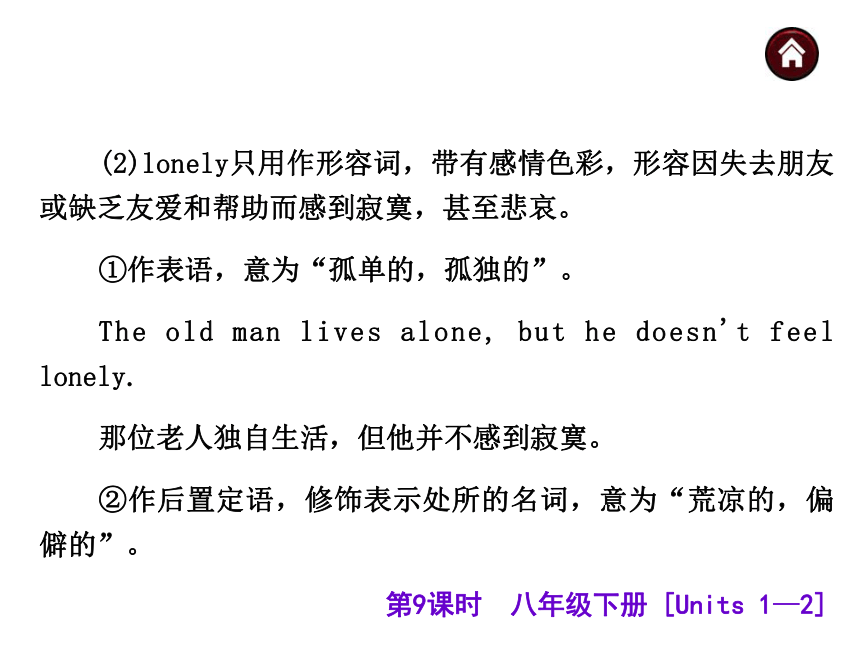
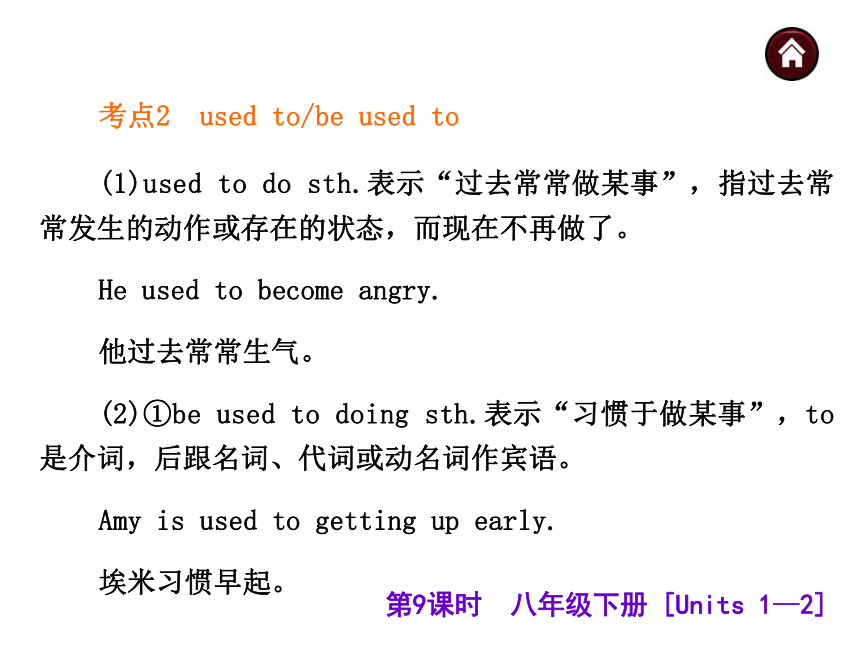
文档简介
课件33张PPT。第9课时 八年级下册 [Units 1—2]第9课时 八年级下册 [Units 1—2]┃基础精梳理 ┃feet stomachsknivesimportancedifficultykindnessdecisionclimberdeathfeeling第9课时 八年级下册 [Units 1—2]ownertrainingbrokenexcited/excitinghurthitunderstoodlaycarried第9课时 八年级下册 [Units 1—2]havedownseetakemakeinonhelp off surprise 第9课时 八年级下册 [Units 1—2]totroubleawayupoutused torunofsituation第9课时 八年级下册 [Units 1—2]keepdecisiontakeupofftakeusedatupupgivecome第9课时 八年级下册 [Units 1—2]comeoutupoutupputaftergiveupof第9课时 八年级下册 [Units 1—2]withtroublewrongwithin thesamewaymovingisusedtotaking第9课时 八年级下册 [Units 1—2]volunteersputoffuntilmakeit possible第9课时 八年级下册 [Units 1—2]┃考点巧突破┃考点1 alone/lonely 巧辩异同(1)alone作形容词或副词,意为“独自的(地)”,相当于by oneself,表示客观情况。
She lives alone in the village.
她独自一人生活在那个村庄里。
He is alone in the house.
他独自一人在屋里。第9课时 八年级下册 [Units 1—2](2)lonely只用作形容词,带有感彩,形容因失去朋友或缺乏友爱和帮助而感到寂寞,甚至悲哀。
①作表语,意为“孤单的,孤独的”。
The old man lives alone, but he doesn't feel lonely.
那位老人独自生活,但他并不感到寂寞。
②作后置定语,修饰表示处所的名词,意为“荒凉的,偏僻的”。第9课时 八年级下册 [Units 1—2]考点2 used to/be used to(1)used to do sth.表示“过去常常做某事”,指过去常常发生的动作或存在的状态,而现在不再做了。
He used to become angry.
他过去常常生气。
(2)①be used to doing sth.表示“习惯于做某事”,to是介词,后跟名词、代词或动名词作宾语。
Amy is used to getting up early.
埃米习惯早起。第9课时 八年级下册 [Units 1—2]②be used to do sth.=be used for doing sth.,表示“被用来做某事”。
Knives are used to cut things.
=Knives are used for cutting things.
刀是用来切东西的。第9课时 八年级下册 [Units 1—2]句型点击考点1 —What‘s the matter? 怎么了?
—I have a sore back. 我背痛。[点拨] (1)What's the matter?=What's the trouble?=What's wrong?怎么了?
如果表示“某人(物)怎么了”,要在这几种形式后加上“with sb./sth.”。第9课时 八年级下册 [Units 1—2]—What's the trouble/matter with you?
=What's wrong with you?你怎么了?
—I have a stomachache.我胃痛。
(2)“have+a+症状名词”表示“具有某种病症、症状”,其中不定冠词a不可省略。
I have a headache and a cough.
我头疼而且咳嗽。第9课时 八年级下册 [Units 1—2]考点2 You helped to make it possible for me to have Lucky.
有了你的帮助,我才有可能拥有“幸运儿”。[点拨] “make it+adj.+to do sth.”意为“使做某事……”,it在句中作形式宾语,形容词作宾语补足语,动词不定式作真正的宾语。能用于该句型的动词还有think, feel, find等。
Our teacher makes it interesting to learn English. 我们的老师使学英语变得有趣。第9课时 八年级下册 [Units 1—2]┃智能双提升┃基础过关Ⅰ.单词拼写
根据首字母及汉语提示,完成下列单词的拼写,使句意明确,语言通顺。
1.Song Yang, a bus driver, will be remembered for having saved p________ (乘客).
2.The box is too heavy for me. Would you please help me c________ (搬运) it?assengers arry第9课时 八年级下册 [Units 1—2]3.They have made a d________ (决定) to build a big factory here.
4. Lucy often learns French by h________ (自己) after school.
5.Can you i________ (想象) what your life will be like in ten years?ecisionerselfmagine第9课时 八年级下册 [Units 1—2]Ⅱ. 单项填空
1. —Why can't you sleep well?
—Because there is something wrong ________ my head.
A. with B. for C. of D. atA第9课时 八年级下册 [Units 1—2]2. —Lucy and Lily look very ________. Are they twin sisters?
—Yes, they are.
A. special B. simple
C. similar D. quietC由“她们是双胞胎姐妹吗?”可知前句句意应该是“露西和莉莉看上去很像”。故选C。第9课时 八年级下册 [Units 1—2]3. —The passage is very long. But there aren't any new words in it.
—Good. So it will be easy for us to ________.
A. refuse B. improve
C. invite D. understandD根据上句“这篇文章中没有新的单词”可知应该是容易“理解”。故选D。第9课时 八年级下册 [Units 1—2]4. —How was the youth club last night, Mark?
—It was great fun. You ________ come.
A. must B. can C. should D. mayC根据答语“它很有趣”,可知下句句意应该为“你应该来”。故选C。第9课时 八年级下册 [Units 1—2]5. ________ the new computer, passengers at the offices of the CAAC can now buy their airplane tickets much faster.
A. Thank for B. Thanks to
C. Because of D. Even thoughB第9课时 八年级下册 [Units 1—2]1. [2014·福州] —Jack, I have ________ working out the math problem.
—Don't worry. Let me help you.
A. fun B. trouble C. experience D. a good time中考透视B考查名词(短语)辨析。fun 意为“乐趣”;trouble 意为“麻烦,困难”;experience 意为“经验”;a good time意为“一段美好时光”。根据下句可推知:解决这道数学题我有困难,故选B。 have trouble doing sth. 意为“做某事有困难”。第9课时 八年级下册 [Units 1—2]2.[2014·连云港] China is going to ________ a manned space station around 2020 to explore more space.
A. set up B. put up C. wake up D. turn upA考查动词短语辨析。句意:为了探索更多的宇宙空间,中国计划在2020年建一个载人空间站。set up意为“建立,设立”;put up意为“张贴”;wake up意为“叫醒”;turn up意为“调高”。第9课时 八年级下册 [Units 1—2]3.[2014·云南] —Oh, dear! Your room is untidy.
—Sorry, Mom. I'll ________.
A. set it up B. clean it up
C. put it up D. look it upB考查动词短语辨析。set up意为“建立”;clean up意为“打扫”;put up意为“张贴;举起;搭建”;look up意为“查阅”。由上句句意“你的房间不整洁”可推测下句句意为“我将打扫一下”。第9课时 八年级下册 [Units 1—2]4. [2014·昆明] We are supposed to ________ a solution to stop people from looking down at their mobile phones while driving cars.
A. come up with B. come from
C. come out D. come true A考查动词短语辨析。句意:我们应该想出一个方法来阻止人们边开汽车边看手机。come up with意为“想出”;come from意为“来自”;come out意为“出来,出版”;come true意为“实现”。结合句意可知选A。第9课时 八年级下册 [Units 1—2]5. [2014·武汉] I used to ________ with my wife and watch TV movies at home.
A. show up B. wake up
C. come up D. stay upD考查动词短语辨析。show up意为“露面”;wake up意为“叫醒”;come up意为“出现,发生”;stay up意为“熬夜”。句意:我过去常和妻子一起熬夜在家里看电视里播放的电影。根据句意可知D项正确。第9课时 八年级下册 [Units 1—2]6. [2014·枣庄] Liu Huan, a famous male singer, has long hair, because he ________ long hair.
A. used to have B. is used to having
C. is used for having D. is used to haveB考查used to的相关短语辨析。used to do sth.意为“过去常常做某事”;be used to doing sth.意为“习惯做某事”;be used for doing sth.相当于be used to do sth.,意为“被用来做某事”。句意:刘欢, 一位著名的男歌手,留着长发,因为他习惯了留长发。故选B。第9课时 八年级下册 [Units 1—2]7.[2014· 黄冈] He told the interviewer that he had run_out_of money to buy old bikes.
A. put away B. turned off
C. taken out D. used upD run out of意为“用光,用完”,与use up意思相同。第9课时 八年级下册 [Units 1—2]8.[2014·襄阳] He failed to break the world record for long jump many times but he never ________ his hope.
A. took off B. put away
C. gave up D. turned down
C考查动词短语辨析。句意:他很多次都没能打破世界跳远纪录, 但是他从未放弃希望。give up意为“放弃”。第9课时 八年级下册 [Units 1—2]9. [2014·阜康、米泉] —What are you packing so many books for, Grandma?
—I'll ________ to the kids in West China.
A. give them up B. give them away
C. give them off D. give them inB考查动词短语辨析。句意:“奶奶, 你为什么打包这么多书?”“我将把它们捐赠给中国西部的孩子们。”give up 意为“放弃”;give away意为“捐赠”;give off意为“发出”;give in意为“屈服”。故选B。第9课时 八年级下册 [Units 1—2]10. [2014·烟台] Learning Chinese really ________ my mind to the Chinese world.
A. called up B. turned up
C. opened up D. made upC考查动词短语辨析。call up意为“打电话”;turn up意为“调高”;open up意为“打开”;make up意为“组成”。根据句意可知选C。
She lives alone in the village.
她独自一人生活在那个村庄里。
He is alone in the house.
他独自一人在屋里。第9课时 八年级下册 [Units 1—2](2)lonely只用作形容词,带有感彩,形容因失去朋友或缺乏友爱和帮助而感到寂寞,甚至悲哀。
①作表语,意为“孤单的,孤独的”。
The old man lives alone, but he doesn't feel lonely.
那位老人独自生活,但他并不感到寂寞。
②作后置定语,修饰表示处所的名词,意为“荒凉的,偏僻的”。第9课时 八年级下册 [Units 1—2]考点2 used to/be used to(1)used to do sth.表示“过去常常做某事”,指过去常常发生的动作或存在的状态,而现在不再做了。
He used to become angry.
他过去常常生气。
(2)①be used to doing sth.表示“习惯于做某事”,to是介词,后跟名词、代词或动名词作宾语。
Amy is used to getting up early.
埃米习惯早起。第9课时 八年级下册 [Units 1—2]②be used to do sth.=be used for doing sth.,表示“被用来做某事”。
Knives are used to cut things.
=Knives are used for cutting things.
刀是用来切东西的。第9课时 八年级下册 [Units 1—2]句型点击考点1 —What‘s the matter? 怎么了?
—I have a sore back. 我背痛。[点拨] (1)What's the matter?=What's the trouble?=What's wrong?怎么了?
如果表示“某人(物)怎么了”,要在这几种形式后加上“with sb./sth.”。第9课时 八年级下册 [Units 1—2]—What's the trouble/matter with you?
=What's wrong with you?你怎么了?
—I have a stomachache.我胃痛。
(2)“have+a+症状名词”表示“具有某种病症、症状”,其中不定冠词a不可省略。
I have a headache and a cough.
我头疼而且咳嗽。第9课时 八年级下册 [Units 1—2]考点2 You helped to make it possible for me to have Lucky.
有了你的帮助,我才有可能拥有“幸运儿”。[点拨] “make it+adj.+to do sth.”意为“使做某事……”,it在句中作形式宾语,形容词作宾语补足语,动词不定式作真正的宾语。能用于该句型的动词还有think, feel, find等。
Our teacher makes it interesting to learn English. 我们的老师使学英语变得有趣。第9课时 八年级下册 [Units 1—2]┃智能双提升┃基础过关Ⅰ.单词拼写
根据首字母及汉语提示,完成下列单词的拼写,使句意明确,语言通顺。
1.Song Yang, a bus driver, will be remembered for having saved p________ (乘客).
2.The box is too heavy for me. Would you please help me c________ (搬运) it?assengers arry第9课时 八年级下册 [Units 1—2]3.They have made a d________ (决定) to build a big factory here.
4. Lucy often learns French by h________ (自己) after school.
5.Can you i________ (想象) what your life will be like in ten years?ecisionerselfmagine第9课时 八年级下册 [Units 1—2]Ⅱ. 单项填空
1. —Why can't you sleep well?
—Because there is something wrong ________ my head.
A. with B. for C. of D. atA第9课时 八年级下册 [Units 1—2]2. —Lucy and Lily look very ________. Are they twin sisters?
—Yes, they are.
A. special B. simple
C. similar D. quietC由“她们是双胞胎姐妹吗?”可知前句句意应该是“露西和莉莉看上去很像”。故选C。第9课时 八年级下册 [Units 1—2]3. —The passage is very long. But there aren't any new words in it.
—Good. So it will be easy for us to ________.
A. refuse B. improve
C. invite D. understandD根据上句“这篇文章中没有新的单词”可知应该是容易“理解”。故选D。第9课时 八年级下册 [Units 1—2]4. —How was the youth club last night, Mark?
—It was great fun. You ________ come.
A. must B. can C. should D. mayC根据答语“它很有趣”,可知下句句意应该为“你应该来”。故选C。第9课时 八年级下册 [Units 1—2]5. ________ the new computer, passengers at the offices of the CAAC can now buy their airplane tickets much faster.
A. Thank for B. Thanks to
C. Because of D. Even thoughB第9课时 八年级下册 [Units 1—2]1. [2014·福州] —Jack, I have ________ working out the math problem.
—Don't worry. Let me help you.
A. fun B. trouble C. experience D. a good time中考透视B考查名词(短语)辨析。fun 意为“乐趣”;trouble 意为“麻烦,困难”;experience 意为“经验”;a good time意为“一段美好时光”。根据下句可推知:解决这道数学题我有困难,故选B。 have trouble doing sth. 意为“做某事有困难”。第9课时 八年级下册 [Units 1—2]2.[2014·连云港] China is going to ________ a manned space station around 2020 to explore more space.
A. set up B. put up C. wake up D. turn upA考查动词短语辨析。句意:为了探索更多的宇宙空间,中国计划在2020年建一个载人空间站。set up意为“建立,设立”;put up意为“张贴”;wake up意为“叫醒”;turn up意为“调高”。第9课时 八年级下册 [Units 1—2]3.[2014·云南] —Oh, dear! Your room is untidy.
—Sorry, Mom. I'll ________.
A. set it up B. clean it up
C. put it up D. look it upB考查动词短语辨析。set up意为“建立”;clean up意为“打扫”;put up意为“张贴;举起;搭建”;look up意为“查阅”。由上句句意“你的房间不整洁”可推测下句句意为“我将打扫一下”。第9课时 八年级下册 [Units 1—2]4. [2014·昆明] We are supposed to ________ a solution to stop people from looking down at their mobile phones while driving cars.
A. come up with B. come from
C. come out D. come true A考查动词短语辨析。句意:我们应该想出一个方法来阻止人们边开汽车边看手机。come up with意为“想出”;come from意为“来自”;come out意为“出来,出版”;come true意为“实现”。结合句意可知选A。第9课时 八年级下册 [Units 1—2]5. [2014·武汉] I used to ________ with my wife and watch TV movies at home.
A. show up B. wake up
C. come up D. stay upD考查动词短语辨析。show up意为“露面”;wake up意为“叫醒”;come up意为“出现,发生”;stay up意为“熬夜”。句意:我过去常和妻子一起熬夜在家里看电视里播放的电影。根据句意可知D项正确。第9课时 八年级下册 [Units 1—2]6. [2014·枣庄] Liu Huan, a famous male singer, has long hair, because he ________ long hair.
A. used to have B. is used to having
C. is used for having D. is used to haveB考查used to的相关短语辨析。used to do sth.意为“过去常常做某事”;be used to doing sth.意为“习惯做某事”;be used for doing sth.相当于be used to do sth.,意为“被用来做某事”。句意:刘欢, 一位著名的男歌手,留着长发,因为他习惯了留长发。故选B。第9课时 八年级下册 [Units 1—2]7.[2014· 黄冈] He told the interviewer that he had run_out_of money to buy old bikes.
A. put away B. turned off
C. taken out D. used upD run out of意为“用光,用完”,与use up意思相同。第9课时 八年级下册 [Units 1—2]8.[2014·襄阳] He failed to break the world record for long jump many times but he never ________ his hope.
A. took off B. put away
C. gave up D. turned down
C考查动词短语辨析。句意:他很多次都没能打破世界跳远纪录, 但是他从未放弃希望。give up意为“放弃”。第9课时 八年级下册 [Units 1—2]9. [2014·阜康、米泉] —What are you packing so many books for, Grandma?
—I'll ________ to the kids in West China.
A. give them up B. give them away
C. give them off D. give them inB考查动词短语辨析。句意:“奶奶, 你为什么打包这么多书?”“我将把它们捐赠给中国西部的孩子们。”give up 意为“放弃”;give away意为“捐赠”;give off意为“发出”;give in意为“屈服”。故选B。第9课时 八年级下册 [Units 1—2]10. [2014·烟台] Learning Chinese really ________ my mind to the Chinese world.
A. called up B. turned up
C. opened up D. made upC考查动词短语辨析。call up意为“打电话”;turn up意为“调高”;open up意为“打开”;make up意为“组成”。根据句意可知选C。
